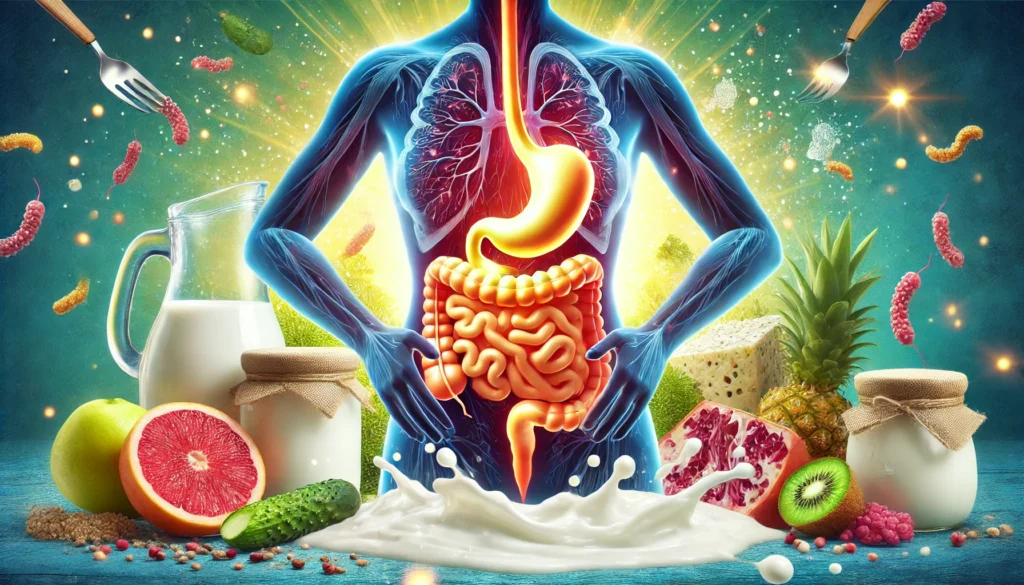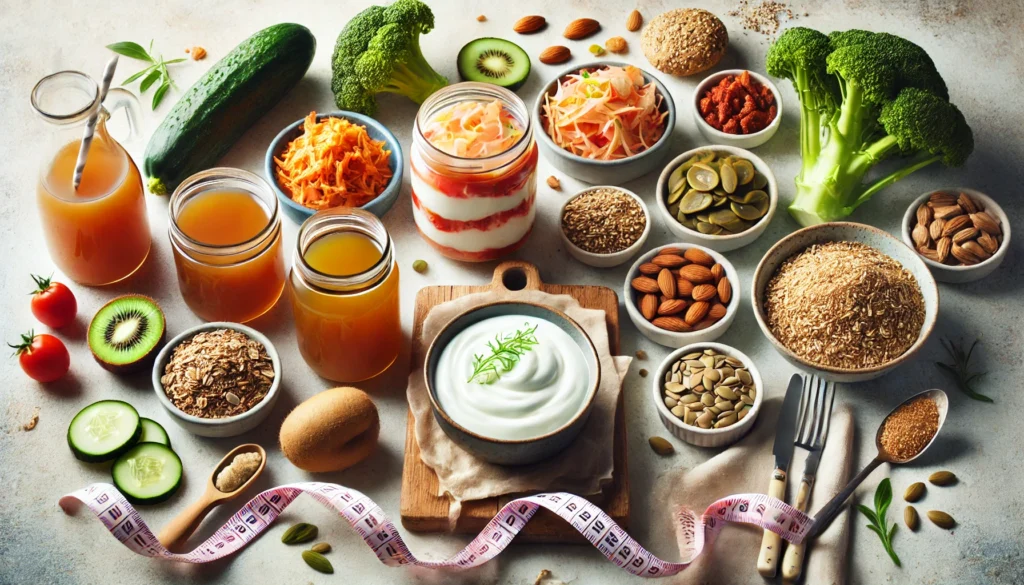Introduction
In recent years, probiotics have gained immense popularity as a crucial component of gut health, digestion, and even weight management. The human gut is home to trillions of bacteria that play a vital role in regulating metabolism, breaking down food, and maintaining immune function. Scientific research suggests that certain probiotic strains can promote a healthier digestive system and aid in weight loss by balancing gut flora, reducing inflammation, and enhancing nutrient absorption. Understanding the best probiotics for weight loss, particularly the best probiotic for women’s weight loss and the best probiotics for belly fat, can provide a natural, effective approach to achieving and maintaining a healthy weight.
You may also like: How to Improve Gut Health Naturally: Science-Backed Tips for a Stronger Microbiome
A well-balanced gut microbiome is not only essential for digestion but also for overall health, including mental well-being and metabolic function. The intricate relationship between gut bacteria and weight management has sparked interest in identifying the best probiotic for gut health and weight loss. This article explores the science behind probiotics, their role in digestion and metabolism, and how they can support fat loss naturally.
The Gut Microbiome and Its Role in Weight Management
The gut microbiome consists of trillions of bacteria, fungi, and other microorganisms that coexist in the digestive tract. These microbes influence digestion, nutrient absorption, immune response, and metabolic function. An imbalance in gut bacteria, often referred to as dysbiosis, has been linked to obesity, metabolic disorders, and digestive issues.
Studies have shown that individuals with obesity tend to have different gut bacteria compositions compared to those with a healthy weight. The Firmicutes-to-Bacteroidetes ratio, in particular, has been associated with body weight regulation. A higher ratio of Firmicutes to Bacteroidetes is commonly observed in overweight individuals, suggesting that an imbalance in gut bacteria may contribute to weight gain by increasing calorie extraction from food.
Restoring microbial balance with the best probiotics for gut health and weight loss can positively impact metabolism and fat storage. Probiotics can help modulate gut bacteria by introducing beneficial strains that promote fat metabolism, reduce inflammation, and enhance insulin sensitivity. Understanding how probiotics influence weight management requires a closer look at their specific mechanisms.
How Probiotics Support Digestion and Weight Loss
Probiotics contribute to weight loss and digestive health through multiple pathways. The following are some of the key mechanisms by which probiotics influence body weight and metabolism:
- Regulation of Appetite and Cravings Certain probiotic strains influence hunger-regulating hormones, such as ghrelin and leptin, which control appetite and satiety. By modulating these hormones, probiotics can help reduce cravings and prevent overeating.
- Reduction of Inflammation Chronic low-grade inflammation is a common factor in obesity and metabolic disorders. Probiotics can lower inflammation by strengthening the gut barrier and preventing harmful substances from entering the bloodstream. This reduction in systemic inflammation supports healthy metabolism and fat loss.
- Improved Fat Metabolism Some probiotic strains have been shown to increase fat oxidation and decrease fat storage. By enhancing lipid metabolism, probiotics help the body utilize fat for energy rather than storing it in adipose tissue.
- Enhanced Insulin Sensitivity Insulin resistance is a significant factor in weight gain and metabolic dysfunction. Probiotics can improve insulin sensitivity, allowing the body to regulate blood sugar levels more efficiently and prevent excess fat accumulation.
- Regulation of Gut Motility Proper digestion and bowel movements are essential for weight management. Probiotics help maintain regular gut motility, reducing bloating and promoting the efficient elimination of waste products.

Best Probiotic Strains for Gut Health and Weight Loss
Not all probiotics are created equal when it comes to supporting digestion and weight loss. The following strains have been identified as some of the best probiotics for belly fat reduction and overall gut health:
- Lactobacillus gasseri: This strain has been extensively studied for its ability to reduce abdominal fat and body weight. It works by inhibiting fat absorption and modulating fat storage genes.
- Bifidobacterium breve: Known for its role in improving gut barrier function, B. breve helps reduce inflammation and supports a balanced gut microbiome.
- Lactobacillus rhamnosus: Research suggests that this strain may help women achieve greater weight loss results, making it one of the best probiotics for women’s weight loss.
- Lactobacillus fermentum: This probiotic aids in reducing fat mass by increasing fat metabolism and decreasing lipid absorption.
- Bifidobacterium lactis: Supports digestion and immune function while contributing to a healthier gut environment, which can aid in weight loss.
Choosing the Best Probiotic Supplement for Weight Loss
When selecting a probiotic supplement, it is crucial to consider several factors to ensure effectiveness:
- Diversity of Strains: A high-quality probiotic should contain multiple beneficial strains that support gut health and metabolism.
- Colony-Forming Units (CFUs): The potency of a probiotic supplement is measured in CFUs. A minimum of 10 billion CFUs per serving is recommended for optimal results.
- Survivability: Probiotics should be formulated to survive stomach acid and reach the intestines intact, where they can exert their beneficial effects.
- Prebiotics: Prebiotics are dietary fibers that feed probiotics and enhance their effectiveness. Look for supplements that contain both probiotics and prebiotics.
- Third-Party Testing: Ensure the probiotic supplement is tested for quality and purity by independent laboratories to verify its potency and safety.
Incorporating Probiotics into a Healthy Lifestyle
While taking a probiotic supplement can be beneficial, incorporating probiotic-rich foods into your diet can further enhance gut health and weight loss. Fermented foods such as yogurt, kefir, sauerkraut, kimchi, and miso are excellent natural sources of probiotics.
A diet rich in fiber, lean proteins, and healthy fats also plays a crucial role in supporting the gut microbiome. Avoiding processed foods, excess sugar, and artificial additives can help maintain a balanced gut environment conducive to weight loss.

Frequently Asked Questions (FAQ) on Probiotics for Gut Health and Weight Loss
1. How do probiotics influence belly fat reduction?
Probiotics impact belly fat by restoring balance in gut bacteria, which can influence metabolism and fat storage. When harmful bacteria outnumber beneficial strains, digestion slows, leading to bloating, weight gain, and fat accumulation around the midsection. The best probiotics for belly fat, such as Lactobacillus gasseri and Bifidobacterium breve, help break down food more efficiently, reducing calorie absorption and promoting fat oxidation. Additionally, they decrease inflammation, which has been linked to obesity and metabolic disorders. By improving insulin sensitivity and reducing stress-related weight gain, probiotics create a healthier gut environment that naturally supports fat loss.
2. Are probiotics effective for long-term weight loss, or do they offer only short-term benefits?
Probiotics can support both short-term and long-term weight loss when combined with a healthy lifestyle. Initially, they help by improving digestion and reducing bloating, which may result in a noticeable difference in belly size. However, their long-term impact is even more significant, as they enhance metabolic function, improve gut health, and regulate appetite. The best probiotic for gut health and weight loss will continue to support weight management by preventing dysbiosis, which can lead to increased fat storage. Consistency is key—regular intake of probiotic-rich foods or supplements can create sustainable weight loss results over time.
3. What makes certain probiotic strains more effective for women’s weight loss?
Women often experience unique weight challenges due to hormonal fluctuations, stress, and metabolic differences. The best probiotic for women weight loss typically includes strains like Lactobacillus rhamnosus, which has been shown to help women lose weight more effectively than men. Probiotics that support gut health also influence estrogen metabolism, which can affect fat distribution. Additionally, women tend to have higher rates of stress-related weight gain, and probiotics such as Bifidobacterium lactis can help regulate cortisol levels, reducing stress-induced cravings and fat accumulation. Choosing a probiotic that aligns with women’s metabolic and hormonal needs can enhance weight loss outcomes.
4. Can taking probiotics help reduce food cravings?
Yes, probiotics can help control cravings by influencing gut-brain communication. Certain strains regulate appetite-related hormones such as leptin and ghrelin, which signal when you’re full or hungry. The best probiotics for weight loss support gut health by balancing microbiota, preventing spikes in blood sugar that can trigger cravings for unhealthy foods. Additionally, an unhealthy gut microbiome may lead to cravings for processed foods high in sugar and fat, as harmful bacteria thrive on these substances. By fostering a healthier gut environment, probiotics encourage better dietary choices and long-term weight management.
5. What are the best natural sources of probiotics for gut health and weight loss?
While probiotic supplements are beneficial, natural food sources can also provide a powerful boost to gut health. Fermented foods like yogurt, kefir, sauerkraut, kimchi, miso, and tempeh contain beneficial probiotic strains that support digestion and metabolism. These foods also contain prebiotics, which feed good bacteria and enhance their effectiveness. Choosing a diet rich in fiber, lean proteins, and healthy fats further optimizes gut health, making it easier for the best probiotics for belly fat to support weight loss. Consistency in consuming these foods can help maintain gut microbiome diversity and metabolic balance.
6. How quickly can probiotics show results in weight loss?
The timeline for visible weight loss results from probiotics varies depending on individual factors such as diet, lifestyle, and overall gut health. Some people notice reduced bloating and improved digestion within a few days, while significant weight changes may take several weeks to months. The best probiotic for gut health and weight loss works gradually by improving metabolism, reducing fat absorption, and enhancing insulin sensitivity. For the best results, probiotics should be taken consistently, combined with a balanced diet and regular physical activity. Long-term use ensures sustained weight management benefits.
7. Do probiotics help with emotional eating and stress-related weight gain?
Probiotics can play a role in managing emotional eating and stress-related weight gain by influencing the gut-brain axis. Gut bacteria produce neurotransmitters like serotonin and dopamine, which regulate mood and stress levels. When the gut microbiome is imbalanced, stress hormones such as cortisol increase, leading to heightened cravings for high-calorie comfort foods. The best probiotic for women weight loss often includes strains that modulate stress responses, such as Lactobacillus helveticus and Bifidobacterium longum. By supporting emotional well-being, probiotics can help individuals make healthier food choices and reduce binge eating episodes.
8. Can probiotics support weight loss without dietary changes?
While probiotics can contribute to weight loss, their effectiveness is significantly enhanced when combined with a healthy diet. The best probiotics for weight loss work by optimizing gut bacteria, but poor dietary choices can counteract their benefits. A diet high in processed foods and sugar can feed harmful bacteria, limiting the impact of probiotics. Eating fiber-rich foods, lean proteins, and healthy fats ensures that probiotics thrive, allowing them to enhance metabolism and digestion. While probiotics alone may offer some benefits, their full potential is unlocked through a balanced lifestyle.
9. Do probiotics cause any side effects when taken for weight loss?
Probiotics are generally safe for most people, but some individuals may experience mild side effects, especially during the initial adjustment period. Temporary bloating, gas, or changes in bowel movements can occur as the gut microbiome adapts to new bacterial strains. Choosing high-quality probiotics with clinically studied strains can minimize discomfort. Additionally, starting with a lower dose and gradually increasing intake allows the body to adjust more smoothly. If persistent side effects occur, consulting a healthcare provider can help determine the best probiotic for gut health and weight loss tailored to individual needs.
10. How can probiotics be combined with exercise for maximum weight loss benefits?
Exercise enhances the effects of probiotics by promoting gut motility and improving microbial diversity. Regular physical activity helps beneficial bacteria thrive, reinforcing the gut’s ability to regulate metabolism and reduce fat storage. The best probiotics for belly fat work synergistically with exercise by reducing inflammation and increasing energy expenditure. Strength training, aerobic exercise, and yoga all support gut health while aiding in weight loss. Incorporating both probiotics and an active lifestyle creates a powerful, holistic approach to achieving long-term weight management success.

Conclusion
Probiotics offer a natural and effective way to support digestion, boost metabolism, and promote fat loss. By selecting the best probiotics for gut health and weight loss, individuals can improve their overall well-being while achieving sustainable weight management. With the right combination of probiotic strains, a balanced diet, and a healthy lifestyle, shedding belly fat and maintaining optimal digestion becomes more attainable. Investing in gut health through high-quality probiotics is a step toward long-term wellness and metabolic efficiency.
gut microbiome balance, digestive health supplements, probiotics for metabolism, healthy gut bacteria, natural weight management, fermented foods benefits, gut-brain connection, probiotics and immunity, prebiotics for gut health, reducing bloating naturally, metabolism boosting probiotics, gut flora and digestion, best foods for gut health, probiotics for inflammation, healthy digestion tips, beneficial gut bacteria, probiotics and mental health, holistic weight loss, gut-friendly diet, improving gut health naturally
Further Reading:
Help You Lose Weight and Belly Fat
Use of probiotics in preventing and treating excess weight and obesity. A systematic review
Can probiotics help you lose weight?
Disclaimer
The information contained in this article is provided for general informational purposes only and is not intended to serve as medical, legal, or professional advice. While Health11News strives to present accurate, up-to-date, and reliable content, no warranty or guarantee, expressed or implied, is made regarding the completeness, accuracy, or adequacy of the information provided. Readers are strongly advised to seek the guidance of a qualified healthcare provider or other relevant professionals before acting on any information contained in this article. Health11News, its authors, editors, and contributors expressly disclaim any liability for any damages, losses, or consequences arising directly or indirectly from the use, interpretation, or reliance on any information presented herein. The views and opinions expressed in this article are those of the author(s) and do not necessarily reflect the official policies or positions of Health11News.


